#Burnt Offering
Text
Redemption Round 3 - Match 8
We were so close to a Desolation v Desolation, y'all. Alas, Section 31 stayed in the rankings with 126 votes last round, and is up against Burnt Offering and its 136 RR2 votes for 256 Redemption Votes so far! Side note, I don't think I put this in any of the posts yet but did y'all know Burnt Offering is partially based on a true story? Like the finding a weird ritual site?
MAG 043 - Section 31 | Spotify - Acast - YT | Wiki | Transcript
Statement of Police Constable Basira Hussain regarding her time investigating strange occurrences as part of Section 31. Statement taken direct from subject.
MAG 037 - Burnt Offering | Spotify - Acast - YT | Wiki | Transcript
Statement of Jason North, regarding the discovery of an alleged ritual site found near Loch Glass in Scotland.
#the magnus tournament#the magnus archives#tma#mag 043#mag 43#mag 043 section 31#mag 43 section 31#section 31#basira hussain#mag 037#mag 37#mag 037 burnt offering#mag 37 burnt offering#burnt offering#jason north#gertrude robinson#agnes montague#the desolation#desolation#redemption round three
22 notes
·
View notes
Text
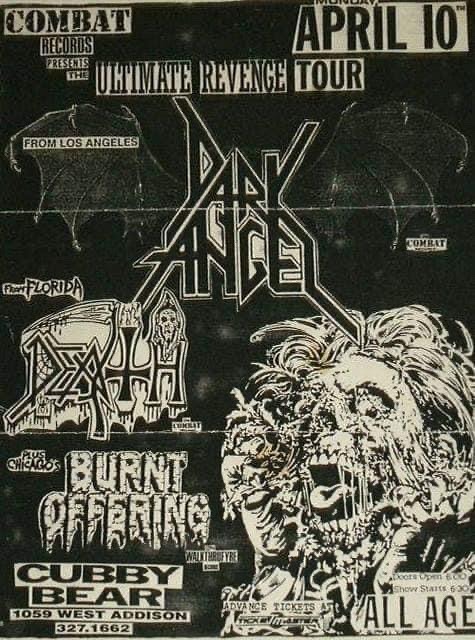
1989 - Chicago
Dark Angel + Death + Burnt Offering
5 notes
·
View notes
Text
Gifts Worthy of a Great God
1 On the day when Moses had finished setting up the tabernacle and had anointed and consecrated it with all its furnishings and had anointed and consecrated the altar with all its utensils, 2 the chiefs of Israel, heads of their fathers’ houses, who were the chiefs of the tribes, who were over those who were listed, approached 3 and brought their offerings before the Lord, six wagons and twelve…
View On WordPress
#atonement#burnt offering#consecration#dedication of the Tabernacle#freewill offerings#God#grain offering#holiness#Israel#Moses#Numbers#Numbers 7#sacrifices#sin#Tabernacle#tribes of israel
0 notes
Text
Leviticus 7: God Explains to Moses the Regulations to Perform a Guilt Offering
1 “‘These are the regulations for the guilt offering, which is most holy:
2 The guilt offering is to be slaughtered in the place where the burnt offering is slaughtered, and its blood is to be splashed against the sides of the altar.
3 All its fat shall be offered: the fat tail and the fat that covers the internal organs,
4 both kidneys with the fat on them near the loins, and the long lobe of the liver, which is to be removed with the kidneys.
5 The priest shall burn them on the altar as a food offering presented to the Lord. It is a guilt offering.
6 Any male in a priest’s family may eat it, but it must be eaten in the sanctuary area; it is most holy.
7 “‘The same law applies to both the sin offering and the guilt offering: They belong to the priest who makes atonement with them.
8 The priest who offers a burnt offering for anyone may keep its hide for himself.
9 Every grain offering baked in an oven or cooked in a pan or on a griddle belongs to the priest who offers it,
10 and every grain offering, whether mixed with olive oil or dry, belongs equally to all the sons of Aaron.
The Fellowship Offering
11 “‘These are the regulations for the fellowship offering anyone may present to the Lord:
12 “‘If they offer it as an expression of thankfulness, then along with this thank offering they are to offer thick loaves made without yeast and with olive oil mixed in, thin loaves made without yeast and brushed with oil, and thick loaves of the finest flour well-kneaded and with oil mixed in.
13 Along with their fellowship offering of thanksgiving they are to present an offering with thick loaves of bread made with yeast.
14 They are to bring one of each kind as an offering, a contribution to the Lord; it belongs to the priest who splashes the blood of the fellowship offering against the altar.
15 The meat of their fellowship offering of thanksgiving must be eaten on the day it is offered; they must leave none of it till morning.
16 “‘If, however, their offering is the result of a vow or is a freewill offering, the sacrifice shall be eaten on the day they offer it, but anything left over may be eaten on the next day.
17 Any meat of the sacrifice left over till the third day must be burned up.
18 If any meat of the fellowship offering is eaten on the third day, the one who offered it will not be accepted. It will not be reckoned to their credit, for it has become impure; the person who eats any of it will be held responsible.
19 “‘Meat that touches anything ceremonially unclean must not be eaten; it must be burned up. As for other meat, anyone ceremonially clean may eat it.
20 But if anyone who is unclean eats any meat of the fellowship offering belonging to the Lord, they must be cut off from their people.
21 Anyone who touches something unclean—whether human uncleanness or an unclean animal or any unclean creature that moves along the ground—and then eats any of the meat of the fellowship offering belonging to the Lord must be cut off from their people.’”
Eating Fat and Blood Forbidden
22 The Lord said to Moses,
23 “Say to the Israelites: ‘Do not eat any of the fat of cattle, sheep or goats.
24 The fat of an animal found dead or torn by wild animals may be used for any other purpose, but you must not eat it.
25 Anyone who eats the fat of an animal from which a food offering may be presented to the Lord must be cut off from their people.
26 And wherever you live, you must not eat the blood of any bird or animal.
27 Anyone who eats blood must be cut off from their people.’”
The Priests’ Share
28 The Lord said to Moses,
29 “Say to the Israelites: ‘Anyone who brings a fellowship offering to the Lord is to bring part of it as their sacrifice to the Lord.
30 With their own hands they are to present the food offering to the Lord; they are to bring the fat, together with the breast, and wave the breast before the Lord as a wave offering.
31 The priest shall burn the fat on the altar, but the breast belongs to Aaron and his sons.
32 You are to give the right thigh of your fellowship offerings to the priest as a contribution.
33 The son of Aaron who offers the blood and the fat of the fellowship offering shall have the right thigh as his share.
34 From the fellowship offerings of the Israelites, I have taken the breast that is waved and the thigh that is presented and have given them to Aaron the priest and his sons as their perpetual share from the Israelites.’”
35 This is the portion of the food offerings presented to the Lord that were allotted to Aaron and his sons on the day they were presented to serve the Lord as priests.
36 On the day they were anointed, the Lord commanded that the Israelites give this to them as their perpetual share for the generations to come.
37 These, then, are the regulations for the burnt offering, the grain offering, the sin offering, the guilt offering, the ordination offering and the fellowship offering,
38 which the Lord gave Moses at Mount Sinai in the Desert of Sinai on the day he commanded the Israelites to bring their offerings to the Lord.
#Leviticus ch.7#Holy Bible#Lord God Jehovah#Moses#Aaron#Israelites#Altar#Tabernacle#Tent of Meeting#Courtyard#Curtain#Generations#Regulations#Guilt Offering#Burnt Offering#Sin Offering#Fellowship Offering#Grain Offering#Atonement#Expression#Thankfulness#Contribution#Freewill Offering#Sacrifice#Thanksgiving#Fat#Blood#Forbidden#Anointed#Mount Sinai
0 notes
Text
john is starting to be nicer to martin, good for him <3
he's leaving my shit list slowly
#johnathan sims hate#martin blackwood#mag 37#burnt offering#mag 37 burnt offering#the magnus archives#tma
1 note
·
View note
Photo

BURNT OFFERING (1976)
Genre -Horror Psychology (US)Plot - Ben Rolfe, seorang penulis telah menyewa sebuah rumah agam untuk bercuti semasa musim panas di situ bersama isterinya Marian dan anak lelakinya Davey. Turut sama dengan mereka ialah makcik Ben iaitu Elizabeth. Pada mulanya, percutian mereka berjalan biasa dan lancar. namun lama kelamaan, Ben merasakan bahawa sikap Marian semakin berubah dan lebih mementingkan keadaan di dalam rumah itu tanpa menghiraukan keluarganya. Ben juga merasakan ada yang tidak kena pada rumah itu kerana berlakunya satu insiden di mana anaknya hampir mati akibat kebocoran gas tanpa diketahui dari mana puncanya.
Komen - Filem klasik yang masih seronok untuk ditonton. Suasana rumah lama yang agak menyeramkan. Lakonan yang agak meyakinkan. Memang jelas vibe penggambaran filem era klasik. Tidak banyak adegan seram
Personal skor - 2/5 (Fliem seram yang tidak banyak seramnya. Lebih banyak bermain pada mimik muka dan emosi lakonan pelakonnya)
Masa tontonan - 116 min
Platform - Tubi
Tarikh akhir tontonan - 24/6/2023
0 notes
Text
The Purpose of Old Testament Sacrifices, Their Fulfillment in Christ
Let us examines the purpose of various sacrifices and offerings in the Old Testament and explores how Christ has fulfilled the Old Testament foreshadowing. By analyzing specific biblical references and occasions, we aim to provide an in-depth understanding of the sacrificial system and its relevance to Christianity today.
Introduction
The sacrificial system of the Old Testament played a crucial…
View On WordPress
0 notes
Text
Be.
Hosea 6:6
“For I desire mercy and not sacrifice, And the knowledge of God more than burnt offerings.”
To ‘be’ and to ‘do’ as a believer.
This week, chose ‘be’. That your knowledge of God will be deepen. Sit awhile with the Lord.
Pastor Robin.
0 notes
Text

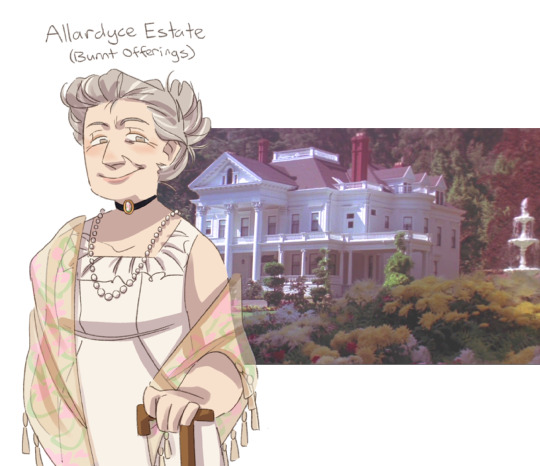

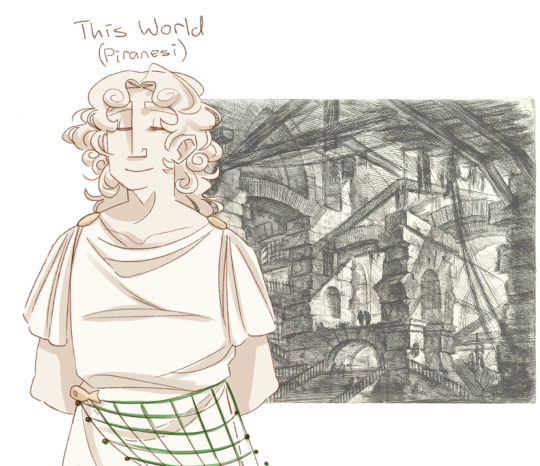

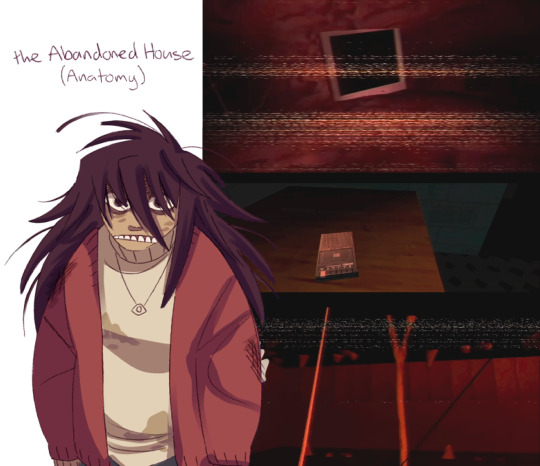
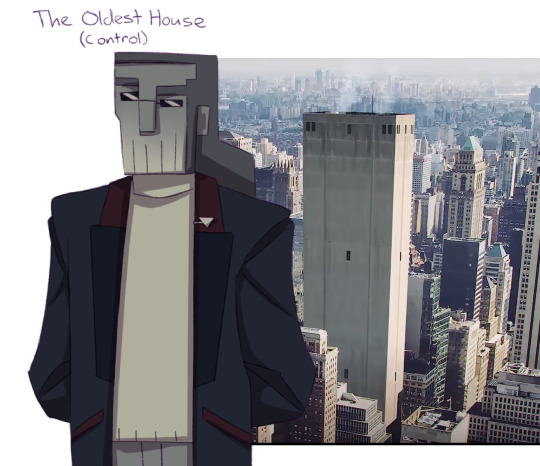
getting really obsessed with houses that are characters
#burnt offerings#1408#piranesi#house of leaves#anatomy#control#kitty horrorshow#fio draws#genius loci
4K notes
·
View notes
Text

studying them under a microscope … human drake and LP real??!!?/$/){*
#i am so tired and burnt out 👍 here’s an offering#darkwing duck#drake mallard#launchpad mcquack#drake#LP#giddly’s art#no id#dwd#dwd human au#darkwing duck human au#idk dawg. i just don’t know
172 notes
·
View notes
Text

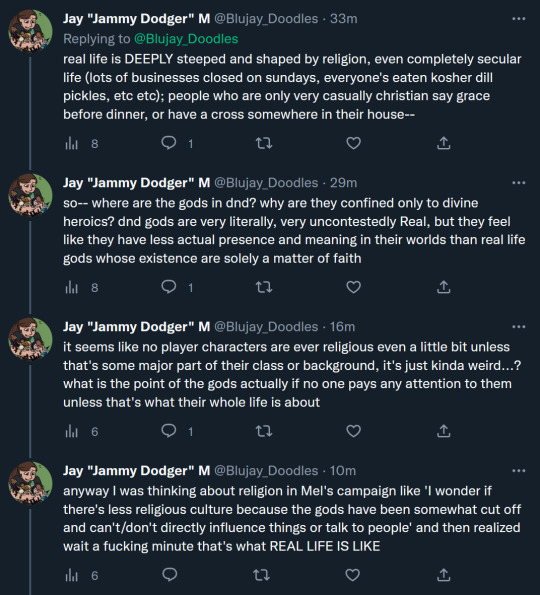
#I've played with irl atheists and catholics and everything in between#but it rarely feels like faith is a real factor for anyone-- DM or player#outside of‚ again‚ divine spellcasters and Big Epic Plot Things#I mean there are a couple of 'RAAAHGH FUCK THE GODS >:C' edgy backstory types but#no one is just Normally Culturally Religious and it's WEIRD#like it's not even a matter of faith in dnd! the gods are LITERALLY OBJECTIVELY PROVABLY REAL#so what does that MEAN for the average person! how does it shape language? business? culture?#where are the people wearing holy symbols like amulets-- or the way modern christians very casually wear crosses?#blessings over meals? prayers before bed? burnt offerings?#and like I enjoy thinking about world and culture building but I know that's A Whole Thing but even just like...#it doesn't feel like anyone believes in gods at all except clerics and paladins#like they DO because they factually exist but in the same way I 'believe in' like. the president of france.#like yeah he exists and is important to some people but has no bearing on my life whatsoever#that's such a fucking weird approach to the DIVINE in a polytheist world where those gods are YOUR CULTURE'S GODS??#I am bad at this myself but I'm not religious so it's harder for me to remember what Being Religious All The Time Casually is like lol#funny enough my character with the most intentionally religious background in this sense#is one of my ones who's ended up wrapped up in Big Plot God Things lmao#'aubree starts the campaign with a holy symbol of yondalla because of course she does why wouldn't she'#'oh okay well she's gonna get deeply and personally entangled with a bunch of death gods immediately' fdkjghkdf oh!! welp#you don't really pray to urogalan unless you're breaking ground for a new building or someone just died so it's STILL weird for her lol#but at least I had the framework there of 'oh yeah the gods exist and matter to me and my everyday life and culture' in general#about me#posts from twitter
743 notes
·
View notes
Text
Redemption Round 2 - Match 15
Nightfall is another one of our high seeds to end up in the Redemption Rounds, with 136 votes from Round Two. Burnt Offering earned 130 votes in Round One and 120 Redemption votes so far!
MAG 109 - Nightfall | Spotify - Acast - YT | Wiki | Transcript
Statement of Julia Montauk, regarding her initial encounters with the hunter Trevor Herbert.
MAG 037 - Burnt Offering | Spotify - Acast - YT | Wiki | Transcript
Statement of Jason North, regarding the discovery of an alleged ritual site found near Loch Glass in Scotland.
#the magnus archives#the magnus tournament#tma#mag 109#mag 109 nightfall#nightfall#julia montauk#trevor herbert#the hunt#hunt#mag 037#mag 37#mag 037 burnt offering#mag 37 burnt offering#burnt offering#jason north#the desolation#desolation#redemption round two
21 notes
·
View notes
Text
x x x x
#landoscar#mctwinks#twinklaren#they're so creepy I adore them#vestal virgins au#the grid all wondering why they smell of burnt offerings and what was that chanting everyone can always hear before races#mine#saudi arabian gp 2024
129 notes
·
View notes
Text
An Impossible Standard to Keep
18 Now when all the people saw the thunder and the flashes of lightning and the sound of the trumpet and the mountain smoking, the people were afraid and trembled, and they stood far off 19 and said to Moses, “You speak to us, and we will listen; but do not let God speak to us, lest we die.” 20 Moses said to the people, “Do not fear, for God has come to test you, that the fear of him may be…
View On WordPress
#atonement#burnt offering#Decalogue#Exodus#Exodus 20#God#holiness#Israel#Moses#redemption#righteousness#sacrifice#sin#Sinai#Ten Commandments#the Law
0 notes
Text
Leviticus 6: God Explains to Moses the Qualifications for a Person to Perform a Guilt Offering
1 The Lord said to Moses:
2 “If anyone sins and is unfaithful to the Lord by deceiving a neighbor about something entrusted to them or left in their care or about something stolen, or if they cheat their neighbor,
3 or if they find lost property and lie about it, or if they swear falsely about any such sin that people may commit—
4 when they sin in any of these ways and realize their guilt, they must return what they have stolen or taken by extortion, or what was entrusted to them, or the lost property they found,
5 or whatever it was they swore falsely about. They must make restitution in full, add a fifth of the value to it and give it all to the owner on the day they present their guilt offering.
6 And as a penalty they must bring to the priest, that is, to the Lord, their guilt offering, a ram from the flock, one without defect and of the proper value.
7 In this way the priest will make atonement for them before the Lord, and they will be forgiven for any of the things they did that made them guilty.”
The Burnt Offering
8 The Lord said to Moses:
9 “Give Aaron and his sons this command: ‘These are the regulations for the burnt offering: The burnt offering is to remain on the altar hearth throughout the night, till morning, and the fire must be kept burning on the altar.
10 The priest shall then put on his linen clothes, with linen undergarments next to his body, and shall remove the ashes of the burnt offering that the fire has consumed on the altar and place them beside the altar.
11 Then he is to take off these clothes and put on others, and carry the ashes outside the camp to a place that is ceremonially clean.
12 The fire on the altar must be kept burning; it must not go out. Every morning the priest is to add firewood and arrange the burnt offering on the fire and burn the fat of the fellowship offerings on it.
13 The fire must be kept burning on the altar continuously; it must not go out.
The Grain Offering
14 “‘These are the regulations for the grain offering: Aaron’s sons are to bring it before the Lord, in front of the altar.
15 The priest is to take a handful of the finest flour and some olive oil, together with all the incense on the grain offering, and burn the memorial portion on the altar as an aroma pleasing to the Lord.
16 Aaron and his sons shall eat the rest of it, but it is to be eaten without yeast in the sanctuary area; they are to eat it in the courtyard of the tent of meeting.
17 It must not be baked with yeast; I have given it as their share of the food offerings presented to me. Like the sin offering and the guilt offering, it is most holy.
18 Any male descendant of Aaron may eat it. For all generations to come it is his perpetual share of the food offerings presented to the Lord. Whatever touches them will become holy.’”
19 The Lord also said to Moses,
20 “This is the offering Aaron and his sons are to bring to the Lord on the day he is anointed: a tenth of an ephah of the finest flour as a regular grain offering, half of it in the morning and half in the evening.
21 It must be prepared with oil on a griddle; bring it well-mixed and present the grain offering broken in pieces as an aroma pleasing to the Lord.
22 The son who is to succeed him as anointed priest shall prepare it. It is the Lord’s perpetual share and is to be burned completely.
23 Every grain offering of a priest shall be burned completely; it must not be eaten.”
The Sin Offering
24 The Lord said to Moses,
25 “Say to Aaron and his sons: ‘These are the regulations for the sin offering: The sin offering is to be slaughtered before the Lord in the place the burnt offering is slaughtered; it is most holy.
26 The priest who offers it shall eat it; it is to be eaten in the sanctuary area, in the courtyard of the tent of meeting.
27 Whatever touches any of the flesh will become holy, and if any of the blood is spattered on a garment, you must wash it in the sanctuary area.
28 The clay pot the meat is cooked in must be broken; but if it is cooked in a bronze pot, the pot is to be scoured and rinsed with water.
29 Any male in a priest’s family may eat it; it is most holy.
30 But any sin offering whose blood is brought into the tent of meeting to make atonement in the Holy Place must not be eaten; it must be burned up.
#Leviticus ch.6#Holy Bible#Lord God Jehovah#Moses#Aaron#Israelites#Priest#Guilt Offering#Grain Offering#Burnt Offering#Sin Offering#Tabernacle#Altar#Animals#No Defect#Blood#Tent of Meeting#Penalty#Proper Value#Fellowship Offering#Ceremonially Clean#Regulations#Memorial Portion#Food Offering#Courtyard#Sanctuary#Atonement#Holy Place
0 notes
Note
something i wanted to ask, genuinely, is if you think the labels transmisogyny/misandry and the way theyre used can really be helpful
i personally think they can be but with how so many ppl try to frame it as "exclusive" forms of oppression just doesnt help at all. yes, transmisogyny does mainly happen to trans women/fems, but a lot of ppl refuse to believe it could also happen to trans men/mascs. and i believe it can go the same way with transmisandry as ive seen multiple ppl describe wut it is and see how it could be applied to trans women/fems. and that doesnt even acknowledge intersex ppl, whether theyre trans or not. i feel like labeling it in specific ways to say "this is an intersection of oppression" without going "this is an exclusive experience" is beneficial to all sides, but ppl try to gatekeep with labels like "tma" and "tme" and so on. its like saying a gay guy cant call themself a dyke bc "youre not a lesbian and therefore u cant reclaim that slur" even if theyve been called a dyke before. it really just feels like the labels of transmisogyny and transmisandry is used as a way to fuel the fires of oppression olympics by saying that "if ur a trans man u experience less oppression than a trans woman." and it seems to be mainly fueled by the idea of "woman (oppressed) + trans (oppressed) = really oppressed" whereas "man (not oppressed) + trans (oppressed) = not as oppressed" when its nothing like that.
its also incredibly hard to find Any information about transmisandry. i always see "trans men just have it/pass easier" and even other transphobic statements of how going on T makes trans men more aggressive and assertive. i feel like tumblr has been the only place ive seen any genuine discussion about transmisandry and even then its not great or very informative.
i believe that both transmisandry and transmisogyny should be acknowledged as real forms of oppression rather than being used as a way to oppress ppl further.
i dont wish to cause an argument as these r just my thoughts and i genuinely want to hear yours on it too
So the TL;DR my opinion sort of boils down to "Yes, I think they can be incredibly useful terms when used with intention and clarity of purpose" but there's a lot of nuance to that opinion. Basically though - I mostly agree with you on a conceptual level anon. I just wanted to write an essay.
(and also I don't fully address some things in this ask because frankly I'm burnt out and don't want to talk about them at the moment and I made this blog to talk about my special interests anyway. Sue me ¯\_(ツ)_/¯)
Something I've been noticing in my reading of Intersectional/trans-inclusive Feminist literature, combined with my engagement with trans activism, over the last few years is: We're all very, very afraid of talking about sexism right now and it absolutely makes sense why.
It makes sense because the conversation has been ground to dirt by TERFs constantly yelling about "sex-based oppression" as a means to be transmisogynist and degrade the womanhood of trans women. However the response to this has been deeply flawed in my opinion.
Instead of actually addressing sexism as it's own distinct form of oppression under an Intersectional lense, we've simply made a hard left into only discussing gender informed oppression and only legitimizing gender informed oppression in the form of misogyny. It's a very uninformed response in my opinion actually - but that also makes sense because it's currently very hard to be informed on general feminist theory and politics at the moment because Radical Feminism is a fucking plague.
In reality though, sexism and misogyny are two different forms of oppression that often overlap because gender and sex are different classes of identity that often overlap.
This degradation of language - both from TERFs conflating sex and gender and from Intersectionals/progressives separating the two so hard they don't even acknowledge sex - is what I think is part of the cause of this problem that is leaving trans men / trans mascs with a massive hole in our ability to discuss our experiences. And not just trans men either!!! It's also nonbinary and intersex people as well who are harmed by this void.
So that begs the question: How do we actually talk about sexism in an Intersectional Feminist, trans inclusive, capacity that combats Radical Feminist rhetoric on sexism?
And the answer? Is carefully, consciously, and in a manner that is aware of several different experiences within the nebulous concept of female identity.
I will actually be using the word "female" as a term a decent amount throughout this post. For the sake of this discussion I am defining "female" as anyone anyone who presently identifies as female due to their assigned sex as well as anyone who is socially treated/viewed as female due to their gender, legal, and/or medical statuses. In this post "female" is an umbrella term that includes cis women, trans men, trans women, nonbinary people, and intersex people who feel that definition applies to them in relation to their sex.
Because the fact of the matter is that Patriarchy and our society at large hate women and they hate people who are assigned female and they hate people who are female and those are distinct categories of people with a lot of overlap and a lot of differences.
Female identity is like venn diagram of sex informed experiences that cis women, trans women, trans men, nonbinary people, and intersex people all have a place in for various different reasons. It's a diverse category of experiences and this should be a touchstone for solidarity, not division in my opinion. The experiences and needs of one group don't inherently negate the experiences and needs of another similar group, even if they conflict, you know?
It's a concept I've actually adopted from disability activists, who often talk about the ways in which disability activism often has to address conflicting needs because sometimes some disabled people's needs are in direct conflict with each other!! Conflicting needs are not something unique to disability activism though.
Most groups and classes people have conflicting needs within themselves and I think there's a lot to be learned in gendered activism from disability activists in this regard. I think often in activist discussions a lot of people stop when situations stop impacting them directly instead of trying to find commonality and empathy with similar experiences. It's easy to have knee jerk reactions, it's harder to pause and contemplate.
So, let's actually contemplate transmisogyny and transandrophobia/transmisandry as terms for a moment.
Transmisogyny was coined as a term by Julia Serano in 2007 in her book The Whipping Girl and I do think it's incredibly useful for describing the ways in which transphobia (the broader oppression of trans individuals) intersects with misogyny (the broader oppression of women) in specific ways wrapped up into a specific term.
I've engaged in a lot of criticism of The Whipping Girl because, well, I think for just about every excellent idea Serano posits about the trans feminine experience she undercuts it with White Feminist rhetoric and simple "cis men and women are opposites therefore trans men and women are opposites" type rhetoric that harms her arguments more than helps them. HOWEVER! Serano herself even articulates that misogyny and transphobia may intersect in ways that impact nonbinary and trans masculine individuals differently from trans feminine individuals, and that additional language may be required to fill that gap in The Whipping Girl!!
So now there's a bit of a linguistically philosophical discussion to be had here on the function of language and what language we can actually use to fill the hole trans men experience with our language - which is also where we dive back into talking about concepts like conflicting needs and sexism.
When creating terminology (or jargon), one must take into account several things like clarity and context, which is why personally - I do not like the term "transmisandry" at all. I use it as a tag because I know some people prefer it as a term and I'd like my posts to reach that audience as well. Generally speaking though - I think any inclusion of "misandry" as a term will always be a nonstarter in most discussions on gender. It's much too loaded of a word because of it's association with the misogynistic actions of MRAs among several other semantic reasons.
An argument could, I think, be made for a term like "transsexism" which would describe the intersection of transphobia (the broader oppression of trans individuals) and sexism (the broader oppression of female individuals) but I think that is still too broad if we want to talk about trans masculine experiences specifically. (Though I do still think it may have contextual use as a term quite frankly - that's just beyond the scope of this post).
So? Then we come to transandrophobia and a conversation on misogynistic, sexist responses to masculinity in people society forcibly identified as "female women" under patriarchy.
I want to state that off the bat that I take a lot of issue with the way people dismiss trans men's experiences as just "general transphobia" or "default transphobia" because... Why are you automatically treating a man's experiences as the universal default? Especially when there are things based on the intersection of his manhood and marginalization that he experiences that women of the same marginalization don't?
I have this issue with most other conversations about the intersection of marginalized identity and manhood honestly. It actually really reeks of unconscious misogynist bias to me. But I digress, that's not the subject of this post.
I think a lot about Brandon Teena and the motivations for his murder. I think a lot about Lou Sullivan's diary entries about his loneliness and isolation with regard to being around trans women and lesbians - as well as his history fighting for his right to medical transition. I think about P. Carl's musings about the ways in which his entire community abandoned him once he came out as a trans man as opposed to a lesbian woman. I think about Irreversible Damage by Abigal Shrier and the way she manipulated - if I'm remembering correctly - YouTuber, Chase Ross into misleading interviews that skewed his words and stories to attempt to "prove" her points about how "our girls" are being manipulated into transgenderism via social contagion spread through platforms like YouTube.
I think about the ways in which trans mascs - particularly those on HRT - actively avoid medical care because of the deeply gendered nature of gynecological care and also because we are treated like medical freaks and abominations when we do try to seek that care. I think about the ways our bodies are inherently, deeply impacted by the overturning of Roe V. Wade and how our decisions to not carry children via abortion or hysterectomy - or our desire to carry children - are met with the phenomenon of medical misogyny like any other woman or female individual but in a way that also explicitly intersects with our transness.
I think about the ways in which Patriarchal society sees my "female" body in direct opposition to my identity as a "man" and how that is something that needs to be "corrected" back into "female womanhood" via rape and assault. I think about my own corrective assault a lot. I think about how the 2015 National Trans Survey actually found higher self reported instances with sexual assault in trans men than in trans women. I think about how I personally see that as a touchstone of solidarity with my lesbian siblings and especially with my other butch siblings who also have their expressions of masculinity treated as deviancy that deserves corrective action.
I apologize for diverting into less of an academic musing into prose and also for diverging from the subject of this ask directly into a much larger essay - but I am simply so tired of trying to say that I and other trans masculine people are people worthy of having our own language for our own experiences instead of just being dismissed as a privileged class - quite literally on the basis of our own oppression.
Especially when people use the words of someone like Julia Serano to say we don't deserve that language when she herself posited that maybe we should have it. Especially when Kimberlé Crenshaw - the woman who created the theory of Intersectionality that Serano is attempting to engage with in The Whipping Girl - has stated that one of the goals of Intersectionality is to create language for and give voice to marginalized identities that otherwise are not given language and voice.
So - What do you call it when trans masculine people are explicitly targeted on the basis of their trans masculinity? What do you call that intersection of sexism, misogyny, and transphobia that misgenders and attacks trans masculinity explicitly? Because that isn't "general transphobia" - that is transphobia motivated by a Patriarchal desire for control over the broader "female identity" that society is seeing as "too masculine".
It's trans-andro-phobia. Transphobia targeted at a particular group of trans individuals on the basis of their masculinity in a way that intersects with a sexist, misogynist, Patriarchal desire to control perceived/forced female identity and the subsequent interpersonal and social ramifications that come alongside that systemic abuse.
Focus, intention, and clarity of purpose.
---
I do want to add that there is absolutely something to be said about the fact that these conversations are all extremely White at the moment.
Radical Feminism is a deeply White (and White Supremacist) movement. Conversations on Trans Feminist theory in general are still deeply White as well. Julia Serano is very much a White Trans Feminist, and as such most responses to her work by other White trans people tend to be, well, very White.
I myself am even contributing to the prevalence of Whiteness in the conversation because even though I am Ashkenazi I am also still White. I might be informed by and am actively using concepts formed by Black Women and Ethnic Minority Women as the basis of my own theories, but that doesn't erase the context of my own race in this conversation either.
I really do not want that to be lost upon people, especially other White people. A racialized context matters in this conversation because Race and Gender really cannot be fully separated from each other in conversations about power and systemic oppression.
Bonus TL;DR - Read The Will to Change and Feminism is for Everybody by bell hooks. Read Audre Lorde. Read Kimberlé Crenshaw. Read Leslie Feinberg and Judith Butler. Read María Lugones. Learn the concepts they are presenting and then also learn how to apply those concepts in a consciousness and self aware manner.
#this isn't perfectly everything i wanted to articulate but i'm tired of this sitting in my drafts#especially when i'm getting really burnt out on offering this kind of essay for free with my main responses to them being sui bait anons#or parasocial bullshit#transmisandry#anti transmasculinity#transandrophobia#transmisogyny#intersectional feminism#feminism#anon#long post /#asks
82 notes
·
View notes